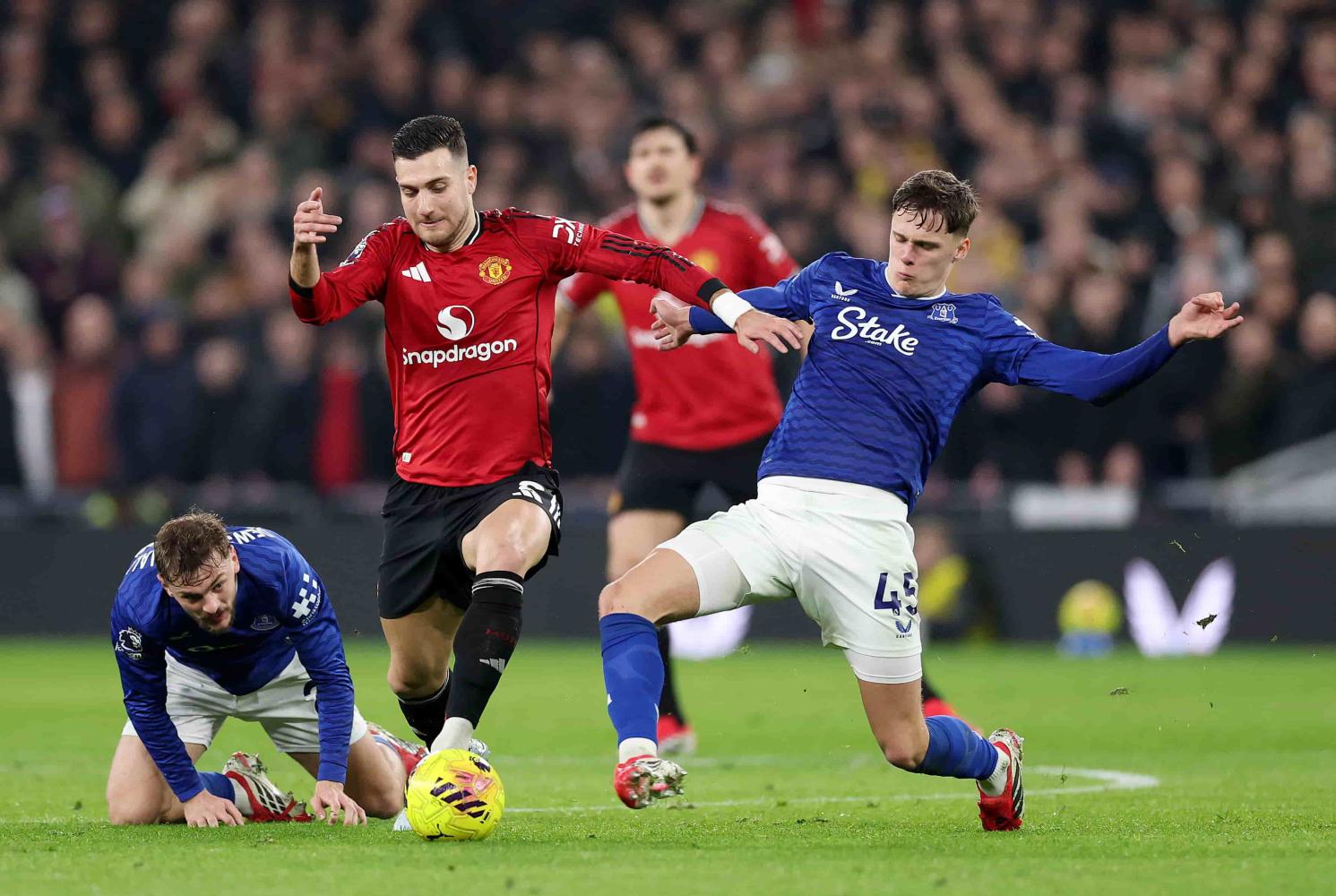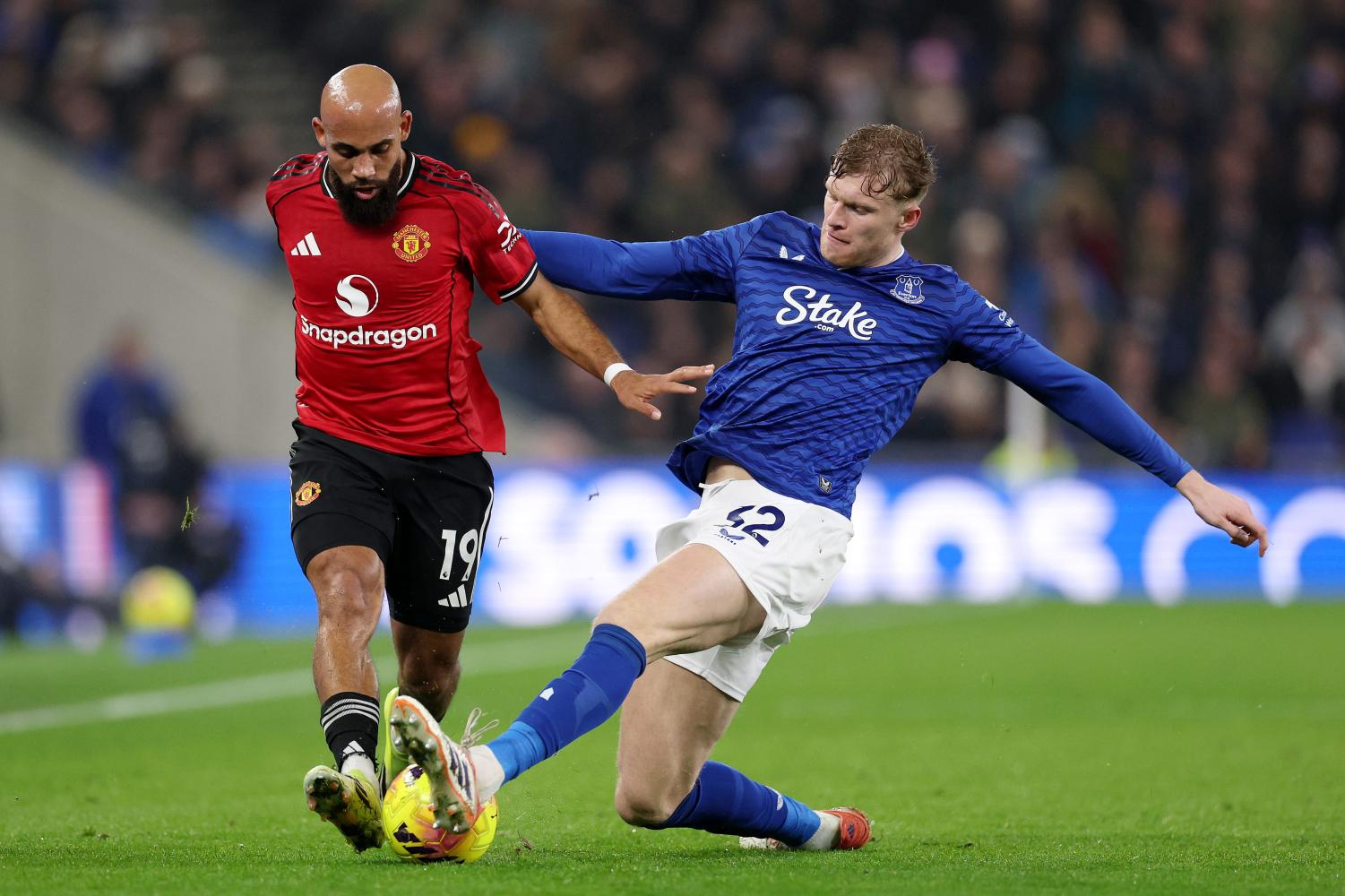|
A View of a Vision Mikey Blue Eyes remembers Alex Young like it was yesterday |
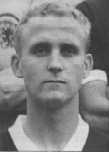 There
are average players. There are good players. There are great
players. And there was Alex Young. Oh yes, he was different
all right. There
are average players. There are good players. There are great
players. And there was Alex Young. Oh yes, he was different
all right.
So different � I've never seen a player like him before or since. You can't buy the kind of memories and feelings somebody like Alex leaves behind. It's just as well because contemporary films do him no sort of justice. The best records are in still photographs caught at the peak of action. But really, you had to experience his play at top form to believe it. Of course there were other great players too during the same era: Bobby Charlton, Jimmy Greaves, Bobby Moore, John White, Alex Parker and many others were all outstanding � never-to-be-forgotten practitioners of the magic arts. All of them left indelible memories. And still there was Alex� To say his impact on 1960 Merseyside was remarkable is like saying Shakespeare could write a bit... or David Lean made the occasional good film... or Robert Bolt had command of the English language. It was one of those moments when cosmic forces acted in unison. We needed somebody like him and he needed a much bigger stage than he had at Heart of Midlothian � even though the Hearts of that time were a truly outstanding team in Scottish football. Everything dovetailed and the thing is: We all knew it at the time. Instantly. Quite simply, I have never ever seen any fans anywhere react to any player the way they did with Alex Young. It was more than extraordinary. When he arrived, Everton Football Club stood on the verge of one of its great eras. John Moores had bought the club and eventually installed Harry Catterick as manager after Johnny Carey failed to deliver. Actually, it was Carey who bought Alex in a double deal which also included full back George Thomson. But new players seemed to be arriving almost weekly. At the same time, our city � despite its intractable problems � was about to become a world-acclaimed centre of popular culture and self-expression. I wouldn't swap that memory for all the hyped-up media phonies in the ether. Nor does it require misty-eyed sentimental nostalgia. All you need is a reliable memory bank and a sense of reality and it all comes flooding back. The first time I saw Alex was an away friendly at Second Division Leeds. It was winter, freezing cold acute angled wind, ankle deep in snow and still snowing. The gate was maybe 3,000. The wonder was that anyone went at all, let alone the thousand or so Blues fans who made the trip by train. Quite rightly, conditions would ensure such a game wouldn't be played today. I went down to the front at pitch level to view the corporeal form at close quarters. It was amazing. He looked like a bank clerk made out of Dresden China - a slight body frame held up a head like a Greek god with wispy waves of short blond hair. Don't hold me to any of the statistics in this essay but I doubt if he ever exceeded 70 kg sopping wet or stood taller than 1.70 m. Seemed to me the wind would gust him over at any moment... But it was how he looked in total. He had natural athletic balance and poise without arrogance. He was almost balletic. He had this ethereal look which later gave him nicknames like The Golden Ghost or The Golden Vision. The moment you saw him you knew how appropriate it all was. See what I mean about his uniqueness? And play?! Oh lordy, could he play! While everybody else understandably slid all over the place and the ball went around like a bearing in a pinball table� there was Alex strolling around like it was August greensward. He killed the wet ball stone dead, he canoodled it, he flicked it with head or foot, he passed it, he dribbled it, he crossed it, he hardly fell over. It was like watching somebody float 50 mm above pitch level. I can still see him in that game with two young Leeds players facing him. One of them was an aggressive young South African player named Gerry Francis, later replaced by Albert Johanssen. Alex killed the glistening orange ball to feet in a flurry of snow crystals and Francis snarled to his team mate, "Gerrim'!!!" And his team mate went in with a tackle designed to flatten your house. The team mate was Jack Charlton... Except the tackle arrived in empty space. Alex was gone. For a microsecond Charlton and Francis looked at each other. Over the years, I got used to that look on opponents faces. It was an almost comical combination of bafflement, fury and hapless despair. Seeing Alex play for the first time was like an epiphany. You wanted to shout, "Hallelulia!" But there was nothing arrogant about the way he played, except in the knowledge of how good he was. He never, ever tried to humiliate anyone. He was far too busy making it all count where it matters, inside the penalty area. It was even possible to have heartfelt sympathy for someone on the receiving end of one of his great displays, especially if it was a physically large player. There were quite a few of those. A few examples will suffice. Our first game of the 1962-63 championship season was at Burnley � then a great team. It was regarded as a severe test of our new team. At centre-back, the Clarets had an accomplished international player nearing the end of his career, Tommy Cummings. Alex went past him on the outside; he went past him on the inside; he out-headed him. He drew him out of position and played the ball into the empty space for anyone who wanted to run onto it... After 60 minutes of this, Alex finally went left into the box using his left foot, dribbled around Cummings as though he wasn't there and casually hit it home from an acute angle. We won the match 3-1. Tommy retired not long afterwards.
In the first half, Alex scored possibly the finest goal I've nearly seen in the Park End. Outside the box, left-side angle and closing, with Mobley looking like a panzer tank blocking the highway. Behind him stood a couple of other defenders, and England international Ron Springett in goal. But you'd never bet against The Golden Vision. He went past Mobley as though he didn't exist, took one stride, and hit the hardest-hit right-foot shot in the world, over and beyond the two flinching defenders and Springett's defeated instincts. It happened in a flash, like a genuine fire-fight, not like those Hollywood scenes. The ball moved like a howitzer shell. The entire Wednesday team felt the shell shock, then and later as Alex dribbled through the lot of them and took us to a 5-1 win. So how did he actually dribble and beat such capable players so easily? Sounds easy when you describe it. But just try it yourself and see how often you fall over. I said earlier he was almost balletic. I chose my words carefully. He had this way of shortening his stride as he got closer to the defender. At times it almost seemed like an Ali shuffle or one of those ankle flutter movements ballet dancers make when they leap off the ground. Of course, at such a moment, a defender has to dive in because it looks as though the ball is about to go loose. As the defender dived in, Alex simply lifted it over his outstretched leg and skipped over with it. But here's the thing: he lifted it so close the defender was caught in two minds and therefore completely off-balance. And Alex was gone. Footy-wise, it was murderous and unanswerable. I saw this done to umpteen defenders and none of them had an effective response until relative age took its toll. Then there was his heading ability. Like everything else, he did it was phenomenal. It would have been so if he had been a tall man. Since he was relatively short, he frequently looked as though he was flying when he headed it. I kid you not. It was mostly in the timing, of course � but he really could leap to an extraordinary height. Other players looked like they were rising and falling around him as he went in for it. Unlike contemporary players, Alex either headed the ball home or it went to one of our players. This was mostly because he was one of those who had the ability to keep his eyes open as he headed the ball � no small instinct and not one you can coach into anyone.
Then there was the occasion he did all of this twice in the space of a minute. Same season, our first midweek home game was to Manchester United. Another huge gate just 500 shy of 70,000. United had just signed Denis Law from Turin. About 15 minutes into the game and a cross came in from the left into the Street End. Alex went up and headed it sharply down and sideways to his left, and as he came down almost casually smashed it in with his left foot. Pandemonium. Literally straight from the kick off we won the ball and Bingham immediately crossed it from the right, Alex leaped in and headed it into the top right corner before anyone could get near him. I have never seen or heard crowd scenes like it before or since, not anywhere. If you said Alex was loved by the fans, it just couldn't describe the way people felt about him. But the course of true love never runs smooth and he had some bad moments. Humans are consistent only in their inconsistency. There was a late-autumn home match against West Ham which we all expected to win comfortably. Needless to say, it didn't work out like that. We battered away but it was still 1-1 with minutes left on the clock and a last surge into the Street End. Young Ray Veall came dribbling in from the left, got just inside the penalty area angle and hit a slow curling shot into the left side of the goal. It bent around the keeper's dive and hit the post about half way up and bounced across the goal area. Where stood Alex, keeper on the floor, no defender near him and only 3 metres out. All he had to do was side foot it in. Which he did. Except he took his eye off it at the last moment, it hit him on the ankle and then shot over the bar. It is the worst miss I have ever seen. On other occasions he just couldn't turn it on and was honest enough to admit it. During such runs, some of the fans took to calling him "the idle idol." True genius is � always has been, and always will be � flawed. There's always a price to pay. Appropriately, my last playing memory of Alex is when he came on as substitute in a winning FA Cup semi-final against Leeds at Old Trafford in 1968. By then, Harry Catterick was well on the way to producing the wonderful championship team of 1969-70 and Young's days were numbered. When he came on, he got a tremendous reception and his presence helped distract a fiery Leeds team in their last-ditch attempts to save the game. The circle was complete. He passed the torch. There's no need to make of Alex what he never was. No need to weave mythical tales. The truth will do. He was a great, truly wonderful player who came along for us at precisely the right moment. He gave us genuine, unmatched memories which can never fade. I doubt if we'll see his like again, anywhere. But if you want to know how easiest to evoke his memory play a Wolfgang Amadeus Mozart disc. Try Eine Kleine Nachtsmusik. The work has remarkable poise, balance and genius. Just like Alex Young � one of the greatest players ever to play in a Royal Blue shirt. Mickey Blue Eyes |

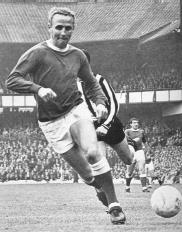 A few years later, we had an early-season midweek home match to
Sheffield Wednesday. The previous week, they had beaten us easily
3-1 at Hillsborough. Their centre-back was a recent England
aspirant named Vic Mobley � as big as a house and tough with it!
As with so many others, Alex looked like a pygmy when he stood next to
him.
A few years later, we had an early-season midweek home match to
Sheffield Wednesday. The previous week, they had beaten us easily
3-1 at Hillsborough. Their centre-back was a recent England
aspirant named Vic Mobley � as big as a house and tough with it!
As with so many others, Alex looked like a pygmy when he stood next to
him. 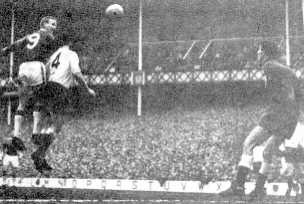 There is a superb photograph of his most famous headed goal. It
was scored at home to Spurs in the championship season of 1962-63 in a
vital game watched by 67,650 fans. It shows everything which made
him a great player. He's on the left of the frame, about a metre
off the ground towering over John Smith, a lad who had at least 100
millimetres in height on him. Right centre is Bill Brown,
Scottish international and far right is big Tony Marchi, both of them
flatfooted. Alex's head is turned through ninety degrees, his arms
outstretched in classic leap-and-head pose. His eyes are open, the
ball on its way over Brown's right shoulder. Me, I was half way up
the Street End right behind the goal. I can still see Alex's head
sending it on its way, Brown's despairing look over his shoulder as it
went home. The geometry is matchless.
There is a superb photograph of his most famous headed goal. It
was scored at home to Spurs in the championship season of 1962-63 in a
vital game watched by 67,650 fans. It shows everything which made
him a great player. He's on the left of the frame, about a metre
off the ground towering over John Smith, a lad who had at least 100
millimetres in height on him. Right centre is Bill Brown,
Scottish international and far right is big Tony Marchi, both of them
flatfooted. Alex's head is turned through ninety degrees, his arms
outstretched in classic leap-and-head pose. His eyes are open, the
ball on its way over Brown's right shoulder. Me, I was half way up
the Street End right behind the goal. I can still see Alex's head
sending it on its way, Brown's despairing look over his shoulder as it
went home. The geometry is matchless.

